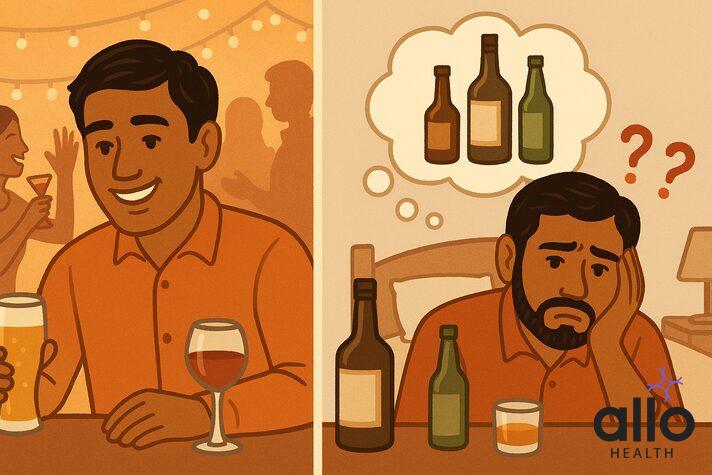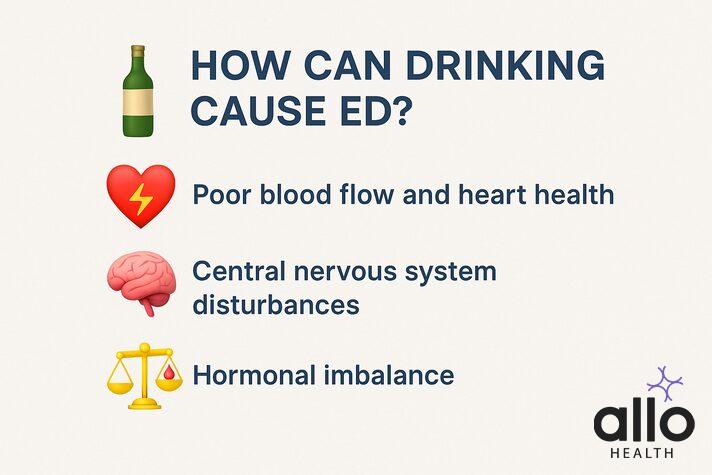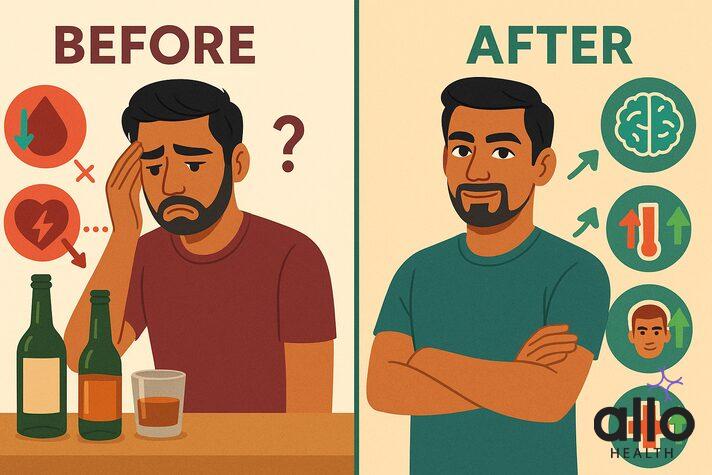Alcohol and Erectile Dysfunction: Understanding the Connection and how it affects sexually

Alcohol impotence is real and it's more common than you think. Drinking disrupts your body's ability to get and keep erections by affecting blood flow, hormone levels, and brain signals. Even short-term drinking can cause what's known as “whiskey dick,” or temporary erectile dysfunction, but long-term alcohol use can lead to chronic ED that doesn’t go away easily. Research shows that alcohol lowers testosterone, slows down brain-to-penis communication, and increases blood pressure, all of which reduce sexual performance. The good news is that many men see improvement within weeks to months after quitting alcohol. However, if erections don’t return even after quitting, other issues like diabetes, heart problems, or stress may be involved. It’s always best to talk to a doctor to get to the root cause. This article covers how alcohol causes ED, recovery timelines, scientific studies, and when to seek help: so you can take control of your sexual health.
Did you notice difficulty getting an erection after drinking? Are you wondering if alcohol has something to do with it? The short answer is yes. Many men experience this issue, commonly known as alcohol impotence.
But what if it starts happening regularly? Long-term alcohol use or dependence can lead to ongoing erection problems.
Alcohol slows down signals from your brain, lowers testosterone, and restricts blood flow to the penis, all of which can make it harder to get or keep an erection.
The good news is that alcohol-related ED is often reversible once you stop drinking.
In this article, we’ll break down how alcohol affects your erections, what changes to expect after quitting, and when it’s time to seek help.
Can Alcohol Cause Impotence?
Yes, there is a direct connection between alcohol and erectile dysfunction. Drinking alcohol has been identified as a clear risk factor for ED. It can lead to both temporary and long-term sexual problems. When alcohol causes temporary erection issues, it’s often called “whiskey dick.” This is a slang term for alcohol-induced erectile dysfunction, where a person finds it hard to get or maintain an erection after drinking.
These links have been proven by many studies and real-world data.
One major study [1] involving 216,461 participants found that men who consumed higher amounts of alcohol had significantly higher rates of erectile dysfunction. This study clearly concludes how impotence from alcohol different from other ED causes. The findings confirmed alcohol as a risk factor for ED, even after adjusting for age, smoking, and other health conditions.
Another study [2] on men with alcohol dependence showed that the severity of ED was directly linked to their dependence on alcohol. 77% of the men with severe alcohol dependence had sexual dysfunction across all areas, including pleasure, desire, and performance.
The new slang ‘whiskey dick’ is real. Alcohol makes it harder for the brain to talk to the penis. That’s why it’s tough to get or stay hard after a few drinks.
How Can Drinking Cause ED?
Now that we know alcohol is a direct risk factor for erectile dysfunction, you might be wondering, how exactly does alcoholism cause erectile dysfunction? Alcohol does it by affecting major systems in the body which are responsible for day to day sexual function.
Poor blood flow and heart health
Healthy erections require healthy blood flow. Alcohol damages blood vessels and create problems with blood circulation, including to the penis. When blood doesn’t flow properly, it becomes harder to get or maintain an erection [3].
-
- A study of 7,655 adults found that heavy drinkers had 2.7 times higher risk of high blood pressure, which is a key cause of poor circulation and ED [4].
- Another 2020 review done on alcohol and heart health confirmed that heavy alcohol use is strongly linked to heart damage, poor circulation, and higher risk of death from heart disease. These cardiovascular diseases are major causes of erectile dysfunction [5].
Central nervous system disturbances
Have you ever felt sleepy or dizzy after drinking? That’s because alcohol slows down your brain [3].
-
- It does this by increasing the effect of GABA (gamma-aminobutyric acid), a chemical that calms down brain activity [6]. When your brain slows down, it sends signals to the body more slowly including the signals that are needed for arousal and erections. This means your brain and penis are not “talking” properly, leading to delayed arousal, dull sensation, and weaker erections.
- A 2020 systematic review found that 16–73% of long-term alcohol abusers suffer from autonomic nervous system dysfunction, where ED was the most common symptom [7].
Hormonal imbalance
Alcohol also affects your hormones like testosterone, which is important for sex drive and strong erections.
-
- Studies show that testosterone levels can start dropping within 30 minutes of drinking alcohol. That’s because alcohol interferes with the hormone control centers in your brain which include: the hypothalamus, pituitary gland, and testes.
- In long-term drinkers, testosterone levels drop even more over time. This can lead to low sex drive, poor erections, and even complete impotence [8].When testosterone is low, men often feel less interested in sex and find it harder to get an erection.
Over the time, these changes in the body can lead to alcohol impotence, where even small amounts of drinking can cause major sexual performance issues.

Will Cutting Back On Alcohol Improve My ED?
Yes, you can see improvement after you stop drinking. Alcohol is a major reason behind erection problems, and if you don’t have any other underlying health issues, cutting it out can help you get firm erections back. In fact, one study [9] found that nearly 88.5% of men with alcohol-related ED saw improvement within just 3 months of quitting. Similarly, at Allo Health, data from over 180,000 consultations supports this: showing clear links between alcohol reduction and ED recovery. When you stop drinking, your testosterone levels begin to rise, blood flow improves, your heart gets healthier, and your brain starts sending signals more clearly. All of these are important for getting and keeping an erection.
Based on our clinical insights at Allo Health:
-
6 out of 10 men with ED were drinking 4+ units daily without realizing the connection
-
Only 1 in 3 patients initially thought their drinking was causing their erection problems
-
Men who drank daily took 40% longer to see improvement compared to those who were occasional drinkers
Recovery Success Rates:
-
Complete alcohol cessation: 94% saw significant improvement within 3 months
-
Reduced to 1–2 drinks per week: 76% experienced better erections
-
Just cut back on quantity: Only 42% saw meaningful changes
These patterns from our patient data show that recovery is possible, but with the right approach.

When To Seek Help For Alcohol Related ED?
Does everyone fix their ED just by quitting alcohol? The simple answer is no, because alcohol is only one of the many causes of erectile dysfunction. So, if your ED doesn’t improve even after you stop drinking, it could mean there are other underlying issues involved.
Other common causes of ED [10] besides alcohol include:
- Cardiovascular problems
- Chronic health conditions like chronic kidney disease, pulmonary diseases, obesity
- Diabetes
- Low testosterone levels
- Stress and anxiety
- Disorders of male reproductive system
All of these can also play a big role in causing or worsening ED. If you’ve quit alcohol but still notice problems, it’s a good idea to talk to a doctor to explore what else might be going on.
Final words
Alcohol can play a major role in causing problems with your sex life. From lowering sex drive to weak erections, these effects can really be concerning and difficult for both you and your partner.
Alcohol can worsen your hormones, blood flow and heart health all of which are responsible for healthy erections. But the good news is that, if your ED is due to alcohol impotence, it is reversible once you reduce or quit alcohol completely.
"The following blog article provides general information and insights on various topics. However, it is important to note that the information presented is not intended as professional advice in any specific field or area. The content of this blog is for general educational and informational purposes only.
Book consultation
The content should not be interpreted as endorsement, recommendation, or guarantee of any product, service, or information mentioned. Readers are solely responsible for the decisions and actions they take based on the information provided in this blog. It is essential to exercise individual judgment, critical thinking, and personal responsibility when applying or implementing any information or suggestions discussed in the blog."






